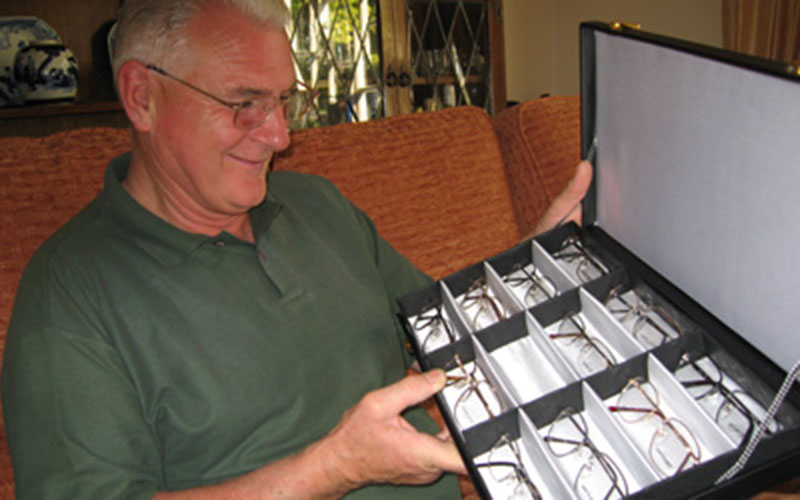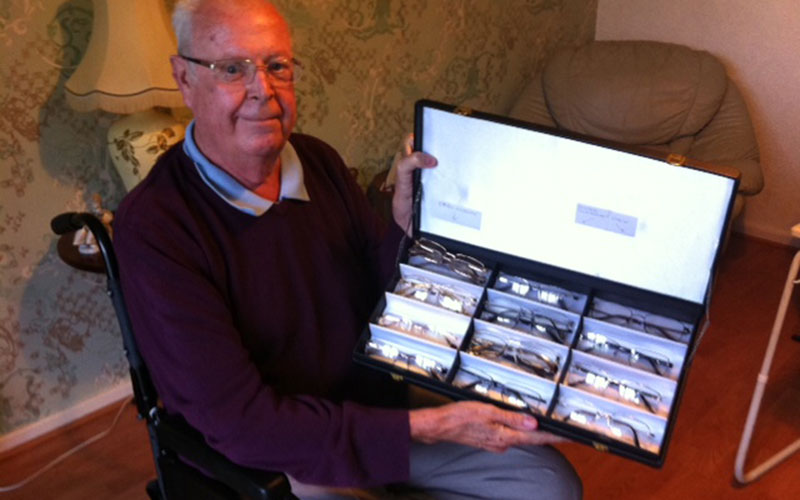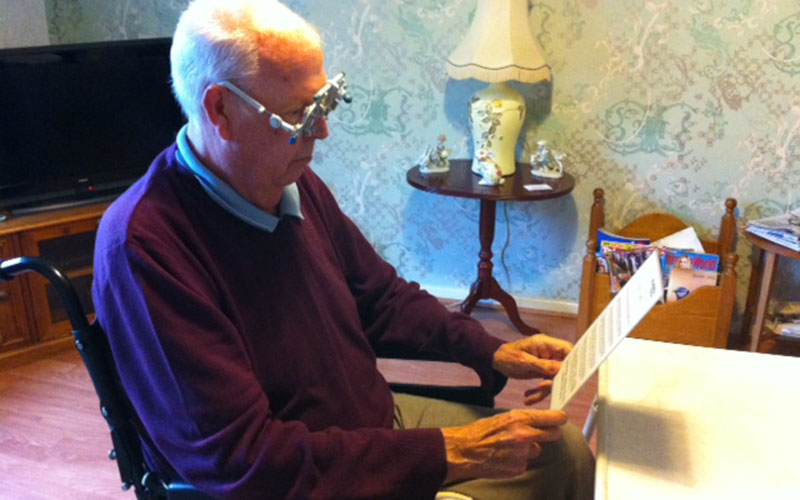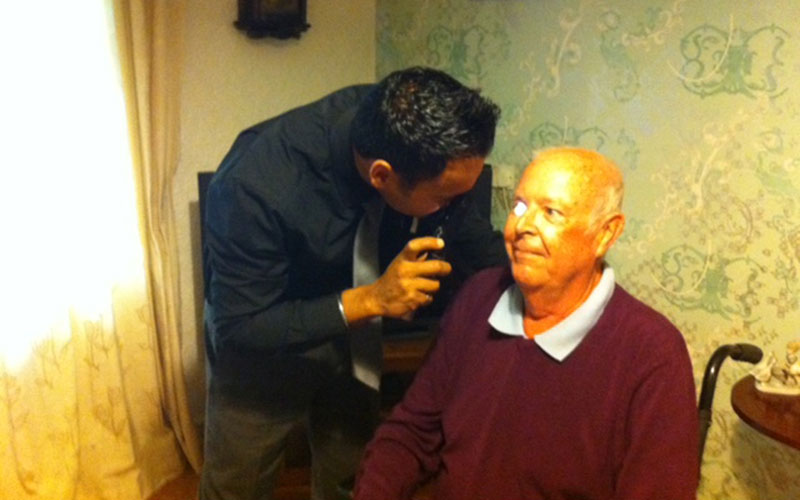What is diabetes?
Diabetes mellitus or `sugar diabetes' affects about one person in fifty in the UK. This means that the body cannot cope normally with sugar and other carbohydrates in the diet.
Diabetes can start in childhood, but it often begins later in life. It can cause complications, which affect different parts of the body. There are two types of diabetes mellitus - one is controlled by insulin injections and the other by diet or tablets, but they both affect the eyes in the same way.
If you have diabetes this does not necessarily mean that your sight will be affected, but there is a higher risk. If your diabetes is well controlled then you are less likely to have problems, or they may be less serious. However if there are complications which affect the eyes then this can result in loss of sight.
Why are regular eye tests are important?
Most sight loss from diabetic retinopathy can be prevented. But it is vital that it is diagnosed early. You may not realise that there is anything wrong with your eyesight, and so regular eye checks are extremely important.
How can diabetes affect the eye?
Your eye has a lens and an aperture (opening) at the front, which adjust to bring objects into focus on the retina at the back of the eye. The retina is made up of a delicate tissue that is sensitive to light, rather like the film in a camera.
At the centre of the retina is the macula, which is a small area about the size of a pinhead. This is the most highly specialised part of the retina and it is vital because it enables you to see fine detail and read small print. The other parts of the retina give you side vision (peripheral vision). Filling the cavity of the eye in front of the retina is a clear jelly-like substance called the vitreous humour.
Diabetes can affect the eye in a number of ways. These usually involve the fine network of blood vessels in the retina - hence the term diabetic retinopathy.
Temporary blurring
Your vision may become blurred for a few days or weeks while your diabetes is first being controlled. This is due to the swelling of the lens of the eye and will soon clear without treatment soon after the diabetes is controlled.
Cataract
This can occur in two forms:
• young people with diabetes very occasionally develop a special type of cataract. Although their vision gets worse, it can be restored by surgery;
• Older people with diabetes can be especially prone to developing cataracts. Cataracts can be successfully removed by surgery and usually it is possible to insert a lens implant. However this is unsuitable for some people and you will be told if this is the case.
Diabetic retinopathy
The most serious diabetic eye condition involves the retina and is called diabetic retinopathy.
Background diabetic retinopathy
This condition is very common in people who have had diabetes for a long time. Your doctor may be able to see abnormalities in your eyes, but there is no threat to your sight. There are two types of diabetic retinopathy, which can damage your sight. Both involve the fine network of blood vessels in the retina. They are described below.
Maculopathy
This happens when the blood vessels in the retina start to leak.
- If the macula is affected, you will find that your central vision gradually gets worse. You may find it difficult to recognise people's faces in the distance or to see detail such as small print. The amount of central vision that is lost varies from person to person. However the vision which allows you to get around at home and outside (navigation vision) will be preserved.
- It is very rare for someone with maculopathy to lose all his or her sight.
Proliferative diabetic retinopathy
Sometimes diabetes can cause the blood vessels in the retina to become blocked. If this happens then new blood vessels form in the eye. This is nature's way of trying to repair the damage so that the retina has a new blood supply.
Unfortunately these new blood vessels are weak. They are also in the wrong place - growing on the surface of the retina and into the vitreous jelly. Consequently these blood vessels can bleed very easily and cause scar tissue to form in the eye. The scarring pulls and distorts the retina. When the retina is pulled out of position this is called retinal detachment.
- This condition is rarer than background retinopathy and is more often found in people who have been insulin dependent for many years.
- The new blood vessels will rarely affect your vision, but their consequences, such as bleeding or retinal detachment can cause your vision to get worse suddenly.
- Your eyesight may become blurred and patchy as the bleeding obscures part of your vision.
- Without treatment, total loss of vision can happen in proliferative retinopathy. With treatment most sight-threatening diabetic problems can be prevented if caught early enough.
The importance of early treatment
Although your vision may be good, changes can be taking place to your retina that need treatment. And because most sight loss in diabetes is preventable:
- early diagnosis is vital
- have an eye examination every year
- do not wait until your vision has deteriorated to have an eye test.
Your family doctor, diabetologist or optometrist can examine for diabetic retinopathy. Photographs are sometimes used to detect abnormalities without any other form of test. If a problem is found you will be referred to a consultant ophthalmologist (a doctor specialising in eyes) at a hospital eye clinic.
Remember, however, that if your vision is getting worse, this does not necessarily mean you have diabetic retinopathy. It may simply be a problem that can be corrected by glasses.
What is the treatment?
Most sight-threatening diabetic problems can be prevented by laser treatment if it is given early enough. It is important to realise however that laser treatment aims to save the sight you have - not to make it better. The laser, a beam of high intensity light, can be focused with extreme precision. So the blood vessels that are leaking fluid into the retina can be sealed. If new blood vessels are growing, more extensive laser treatment has to be carried out. In eight out of ten cases laser treatment causes the new blood vessels to disappear.
How is laser treatment carried out?
All treatment is carried out in an outpatient clinic and you will not have to stay in hospital. Eye drops are used to enlarge the pupils so that the doctor can look into your eye. The eye is then numbed with drops and a small contact lens is put onto your eye to stop it blinking. The eyes need to be moved in certain directions but this can easily be done with the contact lens in place.
Is it painful?
The treatment for sealing blood vessels doesn't usually cause any discomfort. However the treatment to remove new blood vessels can be a bit uncomfortable so you may be given a pain-relieving tablet at the same time as the eyedrops. If the treatment does become painful, then it is possible to have an injection around the eye to numb the pain. Don't be afraid to ask for this injection, especially if you have found a previous session of laser treatment distressing.
Does laser treatment have any side effects?
The treatment for sealing blood vessels has few side effects, although you may lose a little central vision or notice the laser burns as small blank spots.
The laser treatment to remove new blood vessels is more complicated and there may be more side effects. It is quite common to lose some vision to the sides (peripheral vision), and this may mean that you will not be able to drive in future. Night and colour vision may also be reduced. Occasionally your central vision may not be as good as before so that print isn't as easy to see. This is usually temporary but sometimes this doesn't improve. No treatment is possible without some side effects. But the risks of laser treatment are far less than the risks of not having treatment.
What if my eye becomes painful after treatment or if my vision gets worse?
The laser is very bright and causes a temporary reduction of sight, which may last an hour or two after the treatment. Most people have a headache after the more lengthy treatment and you can take a headache tablet for this. However if the pain is severe, or if your eyesight gets worse, you should contact your consultant straightaway.
If your eye condition becomes more severe, causing retinal detachment and scar tissue, it may be possible to perform vitreous surgery. This is highly specialised and you should discuss the various options with a consultant ophthalmologist. Research is continuing into diabetes-related eye conditions, and their treatment is constantly improving.
What if my sight cannot be fully restored?
Much can be done to help you use your remaining vision as fully as possible. You should ask your eye specialist or optometrist about low vision aids. It is also worth registering as partially sighted or blind through your eye specialist. This opens the door to expert help and financial benefits.
Further Help and Information
RNIB Eye Health Campaign
The British Diabetic Association offers advice on all your medical and welfare questions. It can put you in touch with self-help groups, and campaigns on behalf of all people with diabetes. For more information please contact:
British Diabetic Association
10 Queen Anne Street
London
W1M OBD
Telephone: 200-7323 1531
The Partially Sighted Society offers information and advice, publications, aids to vision, enlargement services and local support to help you make the most of your vision. Contact:
The Partially Sighted Society
Queen's Road
Doncaster
DN1 2NX
Telephone: 01302-323132
Information provided by: Royal National Institute for the Blind & Royal College of Ophthalmologists


















